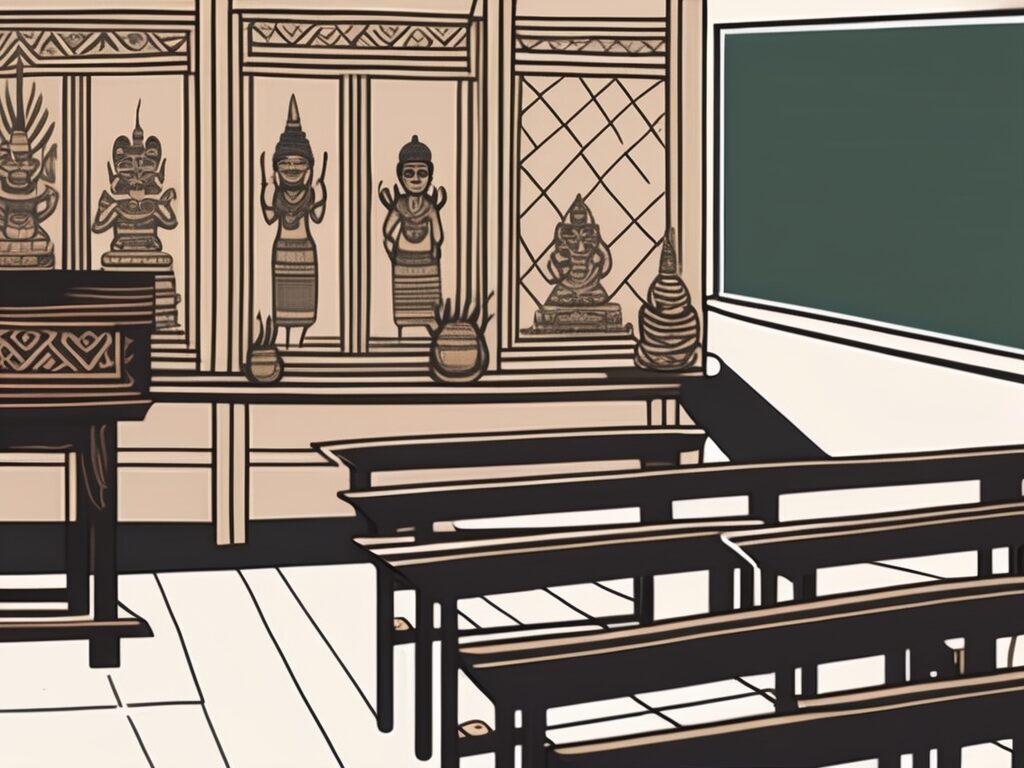Arts and Humanities Education in Indonesia: Trends for 2025
Indonesia, a nation celebrated for its cultural diversity and historical richness, boasts a dynamic arts and humanities education landscape. This sector is profoundly shaped by the country’s educational framework, which is progressively enhancing its focus on arts and humanities. The significance of arts and humanities education in Indonesia is paramount, as it is instrumental in cultivating the nation’s cultural identity and nurturing creativity among its populace.
Current Landscape of Arts and Humanities Education in Indonesia
The Indonesian education system is increasingly incorporating arts and humanities into its curriculum, marking a pivotal transition from the traditional emphasis on STEM (Science, Technology, Engineering, and Mathematics) disciplines. This integration reflects a growing recognition of the necessity for a holistic educational approach.
Despite the progress, the full assimilation of arts and humanities into the educational framework remains a gradual endeavor. Challenges persist, yet the advancements achieved thus far are promising.
Government Initiatives and Support
The Indonesian government plays a crucial role in advancing arts and humanities education through various initiatives. Policies have been enacted to embed traditional arts and cultural studies within the school curriculum, thereby preserving the nation’s rich heritage and fostering a sense of national identity among students.
Additionally, the establishment of cultural centers and museums nationwide serves as a vital resource for students, providing them with opportunities to engage with diverse art forms and cultural practices.
Role of the Private Sector
The private sector significantly contributes to the enhancement of arts and humanities education in Indonesia. Numerous private educational institutions offer extensive programs in these fields, often collaborating with international partners to provide students with a global perspective on arts and humanities.
Moreover, private organizations frequently sponsor arts festivals and competitions, creating platforms for students to exhibit their talents and gain valuable exposure. Such initiatives not only promote arts and humanities education but also cultivate the next generation of artists and scholars.
Advantages of Arts and Humanities Education
Engagement in arts and humanities education yields numerous advantages, including the development of creativity, critical thinking, and cultural awareness—skills that are increasingly vital in today’s interconnected world.
Furthermore, studying these disciplines enriches students’ lives by broadening their perspectives, enhancing their understanding of diverse cultures, and inspiring innovative and critical thought. This educational journey can be likened to adding vibrant hues to a blank canvas, enriching the overall experience.
Fostering Creativity and Innovation
Arts and humanities education promotes creativity and innovation. These subjects empower students to express themselves freely, thereby nurturing their creative capacities. Just as a sculptor meticulously shapes clay, arts and humanities education molds students into innovative thinkers and creators.
Moreover, creativity and innovation are highly sought-after competencies across various industries, providing students who engage in these fields with a competitive advantage in the job market.
Enhancing Cultural Awareness and Empathy
Arts and humanities education also plays a pivotal role in fostering cultural awareness and empathy. By exploring diverse cultures and their artistic expressions, students gain a profound understanding of the world, cultivating respect for cultural diversity akin to appreciating the unique beauty of various art forms.
This cultural awareness can facilitate international collaboration and understanding, rendering it an invaluable asset in today’s globalized environment.
Challenges and Opportunities Ahead
Despite notable advancements in promoting arts and humanities education in Indonesia, several challenges remain. However, these challenges also present opportunities for further development within this sector.
A primary challenge is the perception that arts and humanities are less valuable than STEM subjects, which may dissuade students from pursuing these fields. This situation underscores the need for public education regarding the significance and benefits of arts and humanities education.
Transforming Perceptions
Altering perceptions surrounding arts and humanities education is essential. This transformation involves emphasizing the benefits of these disciplines and showcasing successful individuals who have pursued careers in arts and humanities. Just as an artist employs a palette of colors to create a masterpiece, educators and policymakers can utilize various strategies to present a favorable image of arts and humanities education.
Furthermore, fostering collaborations among schools, cultural institutions, and the private sector can enhance the promotion of arts and humanities education, providing students with practical experiences and exposure that enrich their learning.
Investing in Educational Resources
Investing in resources dedicated to arts and humanities education is a critical step forward. This investment encompasses adequate funding for programs, teacher training, and the development of relevant curriculum materials. Similar to acquiring high-quality materials for an artistic endeavour, such investments can significantly elevate the quality of arts and humanities education.
In conclusion, arts and humanities education in Indonesia has made substantial progress, and the outlook for the future is optimistic. With ongoing efforts from government entities, the private sector, educators, and students, arts and humanities education can continue to thrive, enriching students’ lives and contributing to the cultural vibrancy of the nation.
Enhance Your Impact in Arts and Humanities Education with IPGCE
As an educator dedicated to the arts and humanities, you recognise the importance of ongoing professional development and the necessity for qualifications that facilitate international opportunities. The International Postgraduate Certificate in Education (iPGCE) is designed to support your journey toward achieving Qualified Teacher Status and beyond. Our program addresses common barriers such as stringent qualification requirements, limited career progression, professional isolation, and the complexities of navigating global education systems. By enrolling, you will join a global network of educators, enhance your prospects for interviews and promotions, and potentially increase your salary, all while benefiting from our flexible online study options. Do not allow insufficient credentials to hinder your potential. Join the UK’s leading Teacher Training Course today and elevate your role in shaping the cultural vibrancy of future generations.

